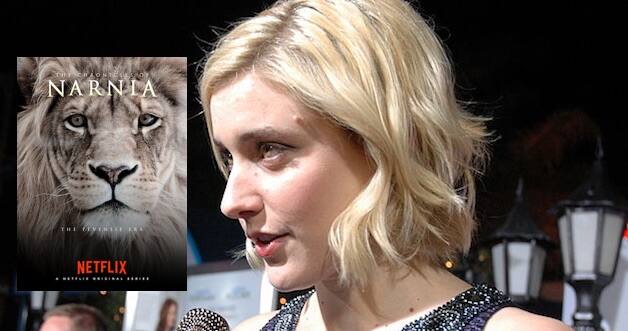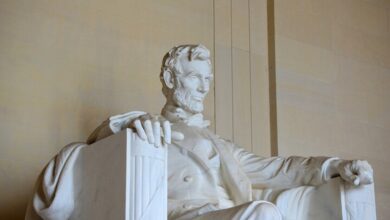Why “Barbie” director is wrong choice to direct “Narnia” reboot

Many people are excited by the news that “Barbie” director Greta Gerwig will be directing the first two “Narnia” movies for Netflix, but a look at her filmography shows she is the wrong choice to direct those films.
Gerwig might be the hottest director in America right now. After two major films under her belt, including “Lady Bird” and “Little Women,” her latest film “Barbie” is breaking box office records and getting rave reviews from critics and audiences.
At the height of the hype for the “Barbie” movie prior to its release, the trades announced that Gerwig would be directing the first two upcoming “The Chronicles of Narnia” films for Netflix, which is planning to adapt all seven of the beloved fantasy books for its streaming service.
For many, this is an ideal choice. “The Chronicles of Narnia” is the acclaimed and best-selling fantasy series by Christian author and apologist C.S. Lewis, and is beloved for taking theological truths about Christianity and exploring them in a way that showed how they were beautiful as well as true, both in his fiction and nonfiction writing. Gerwig has shown she can balance blockbuster entertainment with a distinct artistic voice, can write strong female characters (Narnia’s Lucy often being considered one of the best female characters in literature) and has a strong interest in Christianity, having grown up in Catholic school, as she spoke about in the press for the “Barbie” movie.
Unfortunately, Gerwig directing Narnia is a colossal mistake. Gerwig’s filmography shows that she not only doesn’t share Lewis’ worldview but actively despises it. Having her make a Narnia movie would be like Ayn Rand directing a Spider-Man movie when she doesn’t believe in self-sacrificial heroism.
There are three key ways Gerwig doesn’t share Lewis’ worldview in his Narnia stories:
- The problem of evil
- God versus man
- Heroic men
How are these important to Narnia stories?
Problem 1: The problem of evil
Both Lewis’ “Narnia” books and Gerwig’s “Barbie” deal with how evil came into the world. Lewis wrote “The Lion, the Witch and the Wardrobe,” where he shows how a human is tempted to side with the evil White Witch against his siblings and needs to be saved by the Lion Aslan (the Jesus/God figure in the “Narnia” books), and made a prequel called “The Magician’s Nephew,” in which he retold a version of the biblical account of creation and the introduction of sin into the world.
Gerwig, for her part, has been very open about the fact that “Barbie” is directly inspired by the book of Genesis and the introduction of shame into a perfect world.
But their views of how paradise was upended is completely different. For Lewis, what caused paradise to be lost in “The Magician’s Nephew” was a human — Digory — choosing to break the rules that Aslan had put into the universe, thereby releasing evil (the White Witch) into Aslan’s perfect world. In “The Lion, the Witch and the Wardrobe,” Edmund falls from grace when he decides to side with the White Witch against his siblings in her rebellion against Narnia’s rightful king — Aslan.
This is right in line with the Biblical telling of the fall of mankind. God made everyone and everything good, but then humans were tempted to disobey God’s one rule, and then that disobedience brought evil into the world and then shame.
But Grewig tells the story differently. In Barbieland, what brings shame and pain and chaos is “Stereotypical Barbie’s” intrusive thoughts of death. These lead to her getting flat feet and cellulite, which cause her friends to freak and be grossed out by her (introducing shame) and send her on her quest to restore her to being perfect like she was.
What she discovers, through her quest, as does pretty much every other character in the story, is that the problem was never her or something she did wrong but her shame — that she felt and her friends imposed on her — in feeling like she was not good enough with all her imperfections, even though she already was. It was society forcing standards on her and others, whether it’s gender roles, beauty standards, pressure for romance, or anything else that made her and everyone else miserable, and if we could only get rid of the shame and accept ourselves, the problems would be solved.
The late Rev. Tim Keller describes this view in his book “Forgive” as the belief that philosophers like Nietzsche and Freud had: that feeling guilt and shame were simply holdovers from our Christian past, imposed upon us by society through “interdictions” and by rejecting these standards we could get rid of guilt and shame.
But that’s not how Lewis or traditional Christianity frame their stories. For Lewis and Christianity’s view, we feel ashamed because we have something to be ashamed of. We feel guilty because we are guilty. The answer then is not to deny the sin and reeducate the people who call out the sin but to acknowledge our sin, receive forgiveness and repent of it — even if that’s a lifelong struggle.
Without this view of evil, that we are truly wicked and deserving of our just desserts. Aslan’s Christ-like sacrifice on behalf of someone like that loses its power, and with it, the power of the “Narnia” story itself.
Problem 2. God vs man
Another way Grewig and C.S. Lewis’ visions diverge is her view of the relationship between God and His creatures.
Both Gerwig’s “Barbie” and Lewis’ “Narnia” have stand-ins for God. Barbie is a doll who was created by Ruth Handler, who she gets to meet in the form of her ghost. Narnia has its king (and stand in for God), the lion Aslan.
Aslan is portrayed as a kind but powerful king who demands allegiance and obedience from the creatures he made and the humans who enter his land, and actively works to conquer evil. Meanwhile Ruth is portrayed as a creator who asks nothing, does nothing except quietly advise her creatures and affirm their choices, even when that means going against how she created them to be.
This is typical of positive authority figures in Gerwig films. Authority figures who give orders and make demands, such as Lady Bird’s mom or the Jo March’s publisher, are portrayed as negative. Positive authority figures, such as the sister at Lady Bird’s school, never give orders, but merely advise and affirm.
There is one scene in particular, at the end of Barbie, where Barbie decides she wants to leave Barbieland to live as a “real girl” in the “real world”. She asks her creator Ruth for permission, to which Ruth replies that Barbie doesn’t need her permission. She can and should decide for herself.
By contrast, in “The Magician’s Nephew,” Digory’s moment of truth comes when he has to decide not to steal the apple that might cure his mother. Aslan affirms that if he had stolen it — specifically without getting permission — then things would have gone badly for him, but then Aslan gives Digory permission, and that divine permission makes all the difference.
This is part of the larger difference between Gerwig’s and Lewis’ worldviews. Gerwig fundamentally portrays evil as external authority placing obligations on you that contradict what you want for yourself, whether that’s Ruth creating her to be a doll, society’s gender norms, reality or whatever else. Lewis, however, portrays evil as rebelling against the king of the universe and the reality and purpose that he put into it. Gerwig portrays rebellion against reality as good. Lewis portrays it as evil. In fact, he wrote a whole book, “The Abolition of Man,” about how today’s great modern evil was in trying to reshape reality to our desires rather than submit our desires to reality.
This gets at the heart of Lewis’s medieval Christian theology that many people find so beautiful. Because standing for what’s right means serving the highest authority and the author of all reality, not rebelling against it, reality is ultimately good. Doing the right thing does not alienate you from the universe or reality or our bodies but puts us in greater union with it.
In Gerwig’s movies, every hero is a rebel against (typically male) authority. In Narnia, every hero is a servant of an authority putting down rebels. Even when they are rebelling against authority, it is simply to serve a higher authority. It is hard to imagine a greater difference than that.
Problem 3: Heroic men
Then we get to the last reason Gerwig is wrong for Narnia: her view of men.
One thing one notices if they spend any time watching Gerwig’s films, from “Francis Ha” to “Lady Bird” to “Little Women” to “Barbie,” is that there are no really heroic men. Men are typically placed in roles of being oppressive authority figures, like Jo March’s publisher in “Little Women,” Will Ferrell’s character and Patriarch Ken in “Barbie” — predators and cads like the leering men in “Barbie” or Timothy Chalice’s character in “Lady Bird.”
Where there are good men in Gerwig movies, they mostly exist to be ordered around, demeaned, shouted at or taken for granted by the female characters, whether that’s the dad in “Lady Bird,” Laurie in “Little Women,” Gloria’s husband in “Barbie,” the list goes on. On the rare occasions where good men are allowed to stand up to women or do something heroic, they are punished in some way, whether that’s Friendrich Bhar not getting together with Jo March like he did in the book, or Allen getting yelled at by Gloria and her daughter after saving them from the Kens.
But Lewis never did that
One of the big reasons that I’m a Christian today is because of Lewis’ portrait of heroic men in the “Narnia” books. I grew up as a child obsessed with heroes, particularly superheroes. These characters showed me a vision of men who were both strong and good, who could stand up for themselves and for others against evil. But most of those stories (particularly superhero stories) were secular stories, where God wasn’t a part of the imagination.
Most of the Christian stories I knew growing up went out of their way to make the male heroes unheroic so that God could be the hero of the story — which, you know, fair enough. But this meant that none of these stories sung to my heart as deeply as the superheroes of secular media. There were no stories of heroes that gave me a picture of what a male hero could be in a Christian context that was as beautiful — or more beautiful — than the secular hero stories.
Except in Narnia
Narnia gave me male heroes like Peter Pevensie, Prince Caspian and Reepicheep — and even Edmund and Eustace once they reformed (but let’s be honest, Peter was my favorite) — who offered an aspirational male heroism that was nestled in a Christian imagination rather than secular imagination. These men were brave leaders, kind and self-sacrificial in ways that elevated them rather than demeaned them. In superhero stories, being a hero means standing for your values, but your values — whatever those happened to be — were the only thing that stood above you. In many ways, being a hero was in defiance of an impersonal reality that didn’t care about you. (Later Marvel movies would make that explicit.)
But “Narnia“ created a different vision; in Narnia, being a hero didn’t mean standing alone in defiance of a meaningless universe but standing under the authority of the king of the universe and therefore in your heroism being on the side of reality itself. This gave me a vision of heroism that was stronger and more beautiful than the vision of heroism the secular culture gave me, showing me that Christianity gave me something more beautiful to aspire to than the secular world. Lewis did all this while still giving strong, worthy female characters for girls like my sister to look up to.
What will Gerwig do to Peter and the other men in “The Lion, the Witch and the Wardrobe”? How far will she push Peter’s flaws until he no longer is aspirational, at least until he learns sufficiently from his much wiser sisters to give up his toxic masculinity? I groan just thinking about it.
Why does it matter?
Gerwig isn’t a director who looks at a project and does her best to match the spirit and themes of property she’s adapting. Whether it’s “Little Women” or “Barbie,” she takes the material and deconstructs and remakes it to fit her values. There’s no reason to suspect she won’t do the same to “Narnia.” And when her values are so opposed to the ones that make people fans of his work, that’s bad news for the franchise.
But the problem is not simply a lack of agreement with the themes and values of the source material. The problem is that Gerwig’s values don’t match up against reality, and C.S. Lewis’ do.
As Tim Keller wrote in “Forgive,” when it comes to the shame versus guilt debate, the problem with Gerwig’s view is that we’ve tried it and it hasn’t worked. After decades and decades of trying to get rid of our shame by abandoning Christian moral sensibilities or moving away from our parents who hold such sensibilities, we are not happier. We live in a society where depression and anxiety are growing with each generation. Treating shame hasn’t worked.
Meanwhile, when people imbibe the Christian story — where the diagnosis is guilt and the antidote is forgiveness and repentance — they actually do find relief and peace. Gallup polls found that the only people who’s mental health improved — not just didn’t get worse, but improved — during the pandemic were people who regularly attended church services, whether in person or online.
Gerwig’s answer to our problems, to deny any God-given created purpose to live in tight-knit families and communities and find our meaning and place in the roles we have there, and instead go off on our own to self actualize our desires, has also proven to be false. Jean Twenge, author of books like “Generation Me” and “Generations,” has studied the rise of depression, anxiety and suicide with each passing generation, from the Silent Generation to the baby boomers to Generation X to millennials to Generation Z. She found that it was our slow dissolution further and further in each generation of tight-night communities to go off and be on our own that was the source of our growing despair. As she said, the one group in America that has low rates of depression, anxiety and suicide is the Amish.
Finally, I don’t think anyone would deny anymore we have a crisis of men in our culture. Men feel so disillusioned and alienated from society that they are seeking out villains like Andrew Tate as mentors for masculinity. The last thing men need is people like Gerwig telling them that Tate is right: that being a good man means being a weak, emasculated man. Christianity has been shown to help men to overcome toxic masculinity, but as books like “Why Men Hate Going to Church” and “The Church Impotent” point out, Christianity has been stubbornly unable to attract men for centuries, with women consistently outnumbering men in the church pews and enthusiasm — partly because they too often endorse a version of Gerwig’s vision of masculinity. Like society at large, the last thing the church needs is a Gerwig-helmed “Narnia” to reinforce that for men.
Lewis and his “Narnia” stories are so beloved because they took the truths of Christianity and found a way to weave them into fiction to remind us how beautiful they are. We need that now more than ever. Hopefully, once Gerwig is done with “Narnia,” someone else will adapt it who understands it better, to help recapture those truths for our society again.
–Joseph Holmes is an award-nominated filmmaker and culture critic living in New York City. He is co-host of the podcast “The Overthinkers” and its companion website theoverthinkersjournal.com, where he discusses art, culture and faith with his fellow overthinkers. His other work and contact info can be found at his website josephholmesstudios.com.








